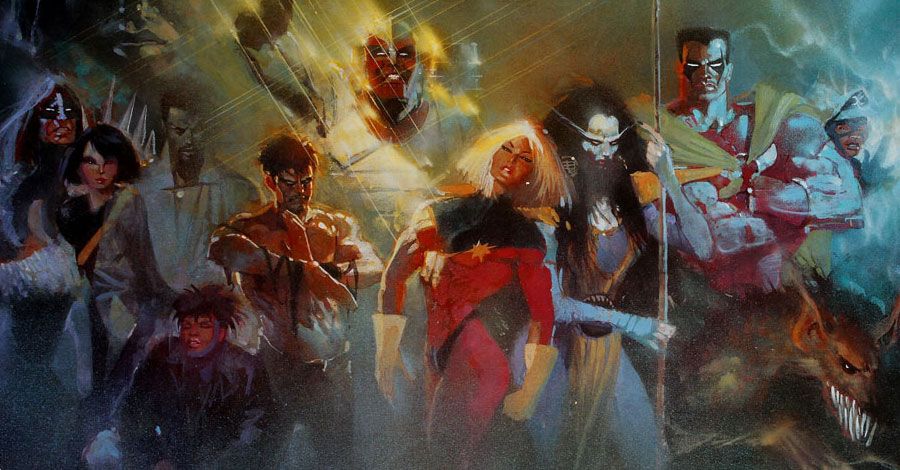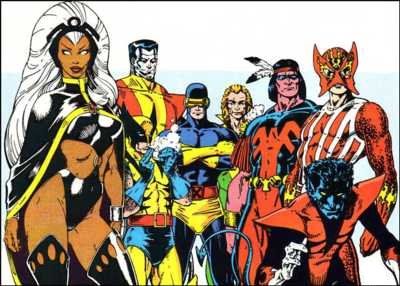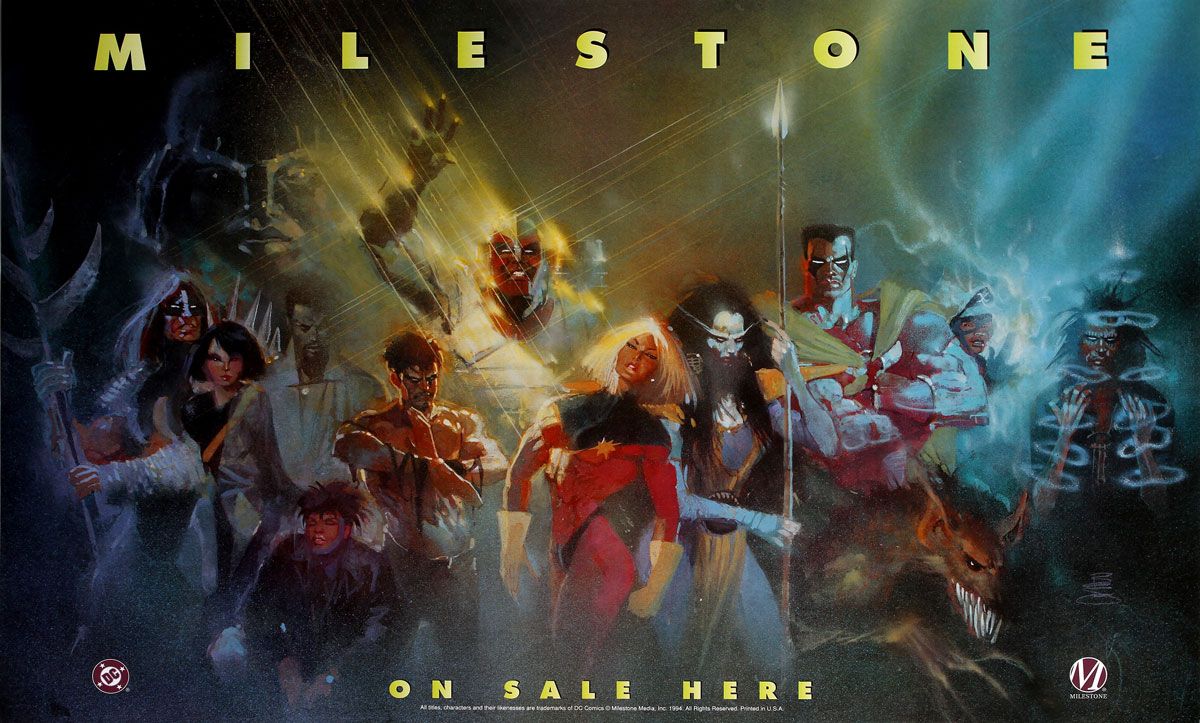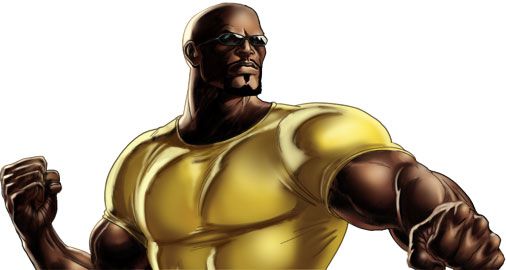Twenty-one years ago, I stood in an office doorway and had an interview to become an intern at Milestone Media, Inc., the first mainstream Black-owned comic book company, published by DC Comics. The interview was conducted by Matt Wayne, Editor, and Dwayne McDuffie, Editor-in-Chief. Matt did most of the talking on the Milestone end, while Dwayne hardly said a word. He was watching, sizing me up, seeing the chip on my shoulder from a mile away, and listening.
Shortly thereafter, I joined the ranks of Milestone, but not because of my interview. Dwayne had doubts about me. He wasn't sure I had the right personality and mindset for a company getting off the ground, like Milestone was at the time.
A friend of mine, illustrator Jason Scott Jones, was also at Milestone at the time, and Dwayne asked Jason about me, knowing that we knew each other, and trusting that Jason would be straight with him.
Jason vouched for me.
Thanks, Jason.
So Dwayne's first point of direct impact on my career and life was his doubt, and the decision to investigate further.
His second point of direct impact was by example on a daily basis, and while I won't deify Dwayne (and he wouldn't want me to) by claiming he was a perfect boss, he was a man of generosity. He gave opportunities to people, sometimes at personal and professional risk to himself, because the idea of generosity was part of his ethos.
His third point of impact was by way of his passing, and it was after mourning in the company of fellow Milestone alumni that it happened, like it happens to a number of us for reasons we will never totally understand.
You wake up one morning, and a number of random thoughts and ideas and feelings you've had for years congeal and align into an understanding of why you're here and which way the wind blows.
Since I started THE COLOR BARRIER, the word "diversity" has popped up more and more in the online comics journalism realm. People whom have barely uttered the word in the press have recently used it, thus continuing the discussion for expanding the landscape of graphic novels and comic books to include more people of color, in the stories and behind the scenes.
More women, more people of LGBT lifestyle, more people who are not the industry's dominant norm.
Discussion is a good and necessary thing -- but action is better.
When former Presidential candidate Mitt Romney said, among other things, "Corporations are people," he may have had the right idea, but he communicated it in the wrong way.
Corporations are, in part, run by the philosophies of their controllers. If you read biographies and autobiographies and interviews of corporate leaders, and look at the history and legacy of the companies they control, you'll likely see a connection.
When companies engage in business practices that expand diversity within their operations and, if applicable, their product, it results in a win-win. Those companies speak to a larger consumer base ready, willing, and eager to spend their money, and through people who inform the product with an authenticity of experience.
Diversity in action.
Top Cow publishes "A Voice In The Dark," a series by disabled creator Larime Taylor, with a Black lesbian as the main character.
Penguin Books hires Professor Nnedi Okorafor to write the novels "Who Fears Death" and "Akata Witch."
Cartoon Network hires LeSean Thomas to be the Producer/Director of "Black Dynamite," an animated series with a Black male lead.
Robert Kirkman's Skybound Entertainment hires Shawn Martinbrough to illustrate "Thief of Thieves," with a Black female as a regular supporting character.
Marvel Comics has a Latino Ghost Rider character with stories written by a Latino, and a Muslim Ms. Marvel character with stories written by a Muslim.
And that's just a handful of examples.
There are probably more characters of color, the female gender and LGBT lifestyle today than at any other point in the industry's history.
But the summit, the apex of diverse representation and talent inclusion, has yet to be reached.
We know which way the wind blows.
What comes next -- is the end of asking. The end of complaining.
There has never been a greater opportunity and feasible means for talented creators to produce and distribute work than now.
Kyle Baker, the grandmaster of creator-owned works like "Why I Hate Saturn" and "The Cowboy Wally Show," knows this.
Alex DeCampi, writer of everything from grindhouse stories to "My Little Pony" to the critically-acclaimed "Smoke/Ashes" graphic novel collection, knows this.
David Walker, writer, filmmaker, and co-writer of Dark Horse's "Number 13" knows this.
Brandon Thomas, co-creator of "The Many Adventures of Miranda Mercury," knows this.
Damion Scott, co-author and illustrator for Penguin Random House, the number one book publisher, knows this.
Becky Cloonan, critically-acclaimed writer/author of indy, mainstream, and her self-published work which includes the critically-acclaimed "Wolves," knows this
Shawn Martinbrough, Grey Williamson and I, three New York-born Black men hired by First Second Books to write and illustrate "The Ren," a graphic novel about the artistic spirit of the period in Black history known as The Harlem Renaissance -- we know this.
The list is longer than a mile, and it continues to grow.
In my introduction editorial, I promised THE COLOR BARRIER would be about hope, and that is the case.
So -- I'm not going to sling mud and obscenities and anger to those people and companies behind us, the ones who don't or won't do the right thing.
I'm going to communicate in the forward direction, with sincere thanks.
Thank you, Derek T. Dingle, Denys Cowan, Dwayne McDuffie and Michael Davis, for giving me a chance back in the day when I had more to learn than I realized.
Thank you, Dennis O'Neil, Jordan Gorfinkel and Darren Vincenzo, for welcoming me into the Batcave so we could create groundbreaking Batman books with diverse characters and a diverse pool of creators.
Thank you, Aki Liao and Mark Smylie, for creating Archaia and giving so many independent creators the opportunity to have their ideas published in beautifully-produced books -- and letting me bring a book about a Black female space hero to the party.
Thank you, Calista Brill of First Second Books, for being one of the best and most patient editors in the graphic novel industry.
Thank you, Geoffrey Thorne, Afua Richardson, Brandon Easton, LeBeau L. Underwood, Phil Jimenez and Jamie Broadnax, for being inspirational people and creators, and for taking the time to speak to the people through this series.
Thank you, Albert Ching, Senior Editor of this site, and all-around fireball of energy, enthusiasm and superhuman editorial reflexes.
Thank you, Jonah Weiland, Executive Producer, for the invitation to produce THE COLOR BARRIER, and keeping the door open for a good while.
And thank you, all of you, who visited, read, commented, spread the word, and engaged the subjects many are unwilling to tackle.
You made a direct impact -- and we will see each other again.
And oh yeah, I promised to say something about Luke Cage moving out of Harlem.
Well, your home town will miss you, Luke, but now that you're in Brooklyn, make sure you plant your flag, walk the streets, and connect with your people.
After all, everyone needs a hero, whether or not they can afford to hire him.
-- Joseph Illidge
Editorial Director




